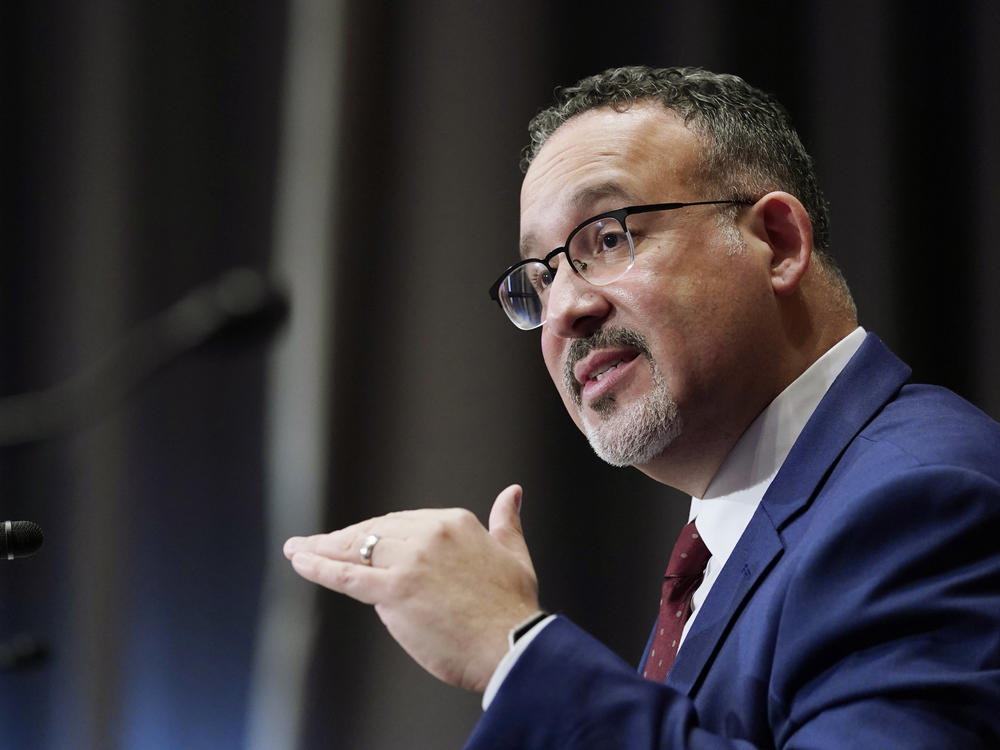Section Branding
Header Content
Lifelong Educator Miguel Cardona Confirmed As Education Secretary
Primary Content
The U.S. Department of Education will have a new leader. Late Monday, in a 64 to 33 vote, the U.S. Senate confirmed Miguel Cardona to be the next secretary of education.
Before being nominated by President Biden, Cardona served as Connecticut's education commissioner for the past year and a half, arguing forcefully that schools should reopen during the COVID-19 crisis in order to keep equity gaps from growing ever wider. Before that, he spent his entire career working for the public school system that helped raise him — as a fourth grade teacher, principal and assistant superintendent in the old factory town of Meriden, Conn.
Cardona assumes the Education Department's top job as the debate around how to safely reopen schools has grown increasingly bitter, with many parents clamoring for children to be able to return to classrooms and with many teachers resisting a return before all educators have been vaccinated. That has forced Biden to walk a political tightrope, reassuring teachers they should be prioritized for the vaccine while new guidance from the Centers for Disease Control and Prevention makes clear that vaccinations should not be a prerequisite for reopening schools.
The school tracking website Burbio suggests schools have been gradually reopening. According to its tracker, 27.5% of students still attend virtual-only schools — down from 31% the week before. An additional 28% attend schools offering limited in-person instruction, while nearly half of districts being tracked now offer daily, face-to-face instruction.
Cardona assumes the top job not long after the department issued guidance late last month requiring states to resume the annual testing of students. The previous education secretary, Betsy DeVos, had waived the requirement in March 2020, raising speculation whether the Biden administration would do the same this spring or restore the requirement.
Testing, like teacher vaccination, has become a painful political wedge for Democrats. Teachers unions have opposed testing requirements, arguing they consume valuable learning time and that many vulnerable students are still home and unable to take the tests easily. The Biden administration, with the backing of some civil rights groups, argues that testing is key to measuring students' progress or lack thereof.
During his confirmation hearing in early February, Cardona echoed the administration's position, saying "if we don't assess where our students are and their level of performance, it's going to be difficult for us to provide targeted support and resource allocation in the manner that can best support the closing of the gaps that have been exacerbated due to this pandemic."
Announcing the testing requirement ahead of Cardona's confirmation means Biden's incoming education secretary can save his political capital for other reopening fights.
Mark Benigni, the superintendent of Meriden Public Schools who promoted Cardona to work with him in the district's central office, told NPR that, if anyone can calm tensions over the reopening fight, it's Cardona. "Miguel's approach is to listen ... to work together to see the other side of the situation. I don't think he's ever, 'It's my way or the highway.'"
Cardona is expected to be sworn in Tuesday.
You can find more about Cardona's positions on everything from school choice to student debt forgiveness here.
NPR also spoke with a few students from Mister Cardona's very first fourth grade class. You can find those interviews here.
Copyright 2021 NPR. To see more, visit https://www.npr.org.
Bottom Content

